Women bishops: Vote could change Church forever
- Published
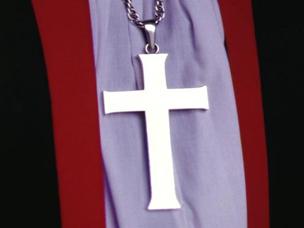
A third of the Church's 11,000 priests are women
The Church of England may be about to turn its back on 2,000 years of Christian tradition by allowing women to be ordained as bishops.
Leaders of the Church's governing General Synod begin meeting later ahead of a vote on Monday on the divisive issue.
Since the days of Jesus and his 12 male apostles, the Church has been led by exclusively male bishops, their authority handed down the generations by the laying on of hands.
There is a general consensus in the Church of England - which ordained women as priests for the first time 18 years ago - that the role of bishop should be open to women too.
Women now constitute a third of the Church's 11,000 priests, several have reached senior positions as archdeacons or the deans of cathedrals, and there's little dispute that they have proved their worth.
'Male-only' tradition
For such a profound step, the General Synod will have to support the legislation to create women bishops by a majority of two-thirds.
Each of the Synod's three houses - representing bishops, clergy and lay people - will have to indicate that level of support.
Despite overwhelming agreement about the need for women bishops in a society where equality is highly valued, and a Church in which women priests have become indispensable, the vote hangs in the balance.
That's because all except the most radical campaigners for women bishops accept the demand from traditionalists for exemptions from serving under them.
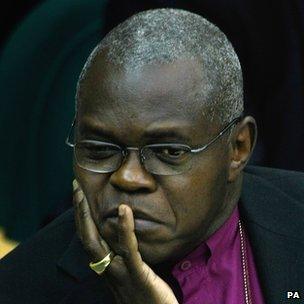
The York wing, lead by Archbishop of York John Sentamu, is more traditional
"High church" traditionalists share the Roman Catholic view that because Jesus chose only men to be his apostles, the spiritual leadership of the Church should be male only.
They argue that because the Roman Catholic Church (from which Anglicans inherited their ancestry of male bishops at the time of the Reformation) and the Orthodox Church cannot accept women bishops, the Church of England is not able to make such a fundamental decision.
Some say it is impossible to be sure that women can be bishops - or priests either for that matter.
For these traditionalists, if a woman presides at Holy Communion, they cannot be sure the bread and wine contain the "real presence" of Jesus.
They argue that if a woman bishop were to ordain a man, they could not be sure he was a real priest.
Conservative sympathy
"Low church" traditionalists, conservative Evangelicals, have their own reasons for wanting exemptions from serving under women bishops.
They read passages from the Bible as teaching that men should exercise the role of leader, whether as the head of families or in the Church.
Although these groups make up a small minority of the Synod, sympathy for them spreads far more widely in a Church used to compromise.
After all, the Church has for centuries combined the Catholic and the Protestant, the conservative and the progressive, and is seen as belonging to the nation and serving all Christian interests.
There have been two-thirds majorities in votes for women bishops before, but never in the Synod's House of Laity.
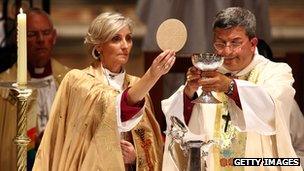
Australia has already ordained women bishops
If voting follows previous patterns, the decision on Monday will rest with a relatively small number of moderate conservatives representing lay Anglicans.
These are supporters of women bishops, but determined to protect the interests of traditionalists.
To try to secure their support, and to reassure traditionalists, senior Anglican bishops exercised their right to make a last-minute amendment to the legislation.
They inserted a clause giving traditionalist parishes not only the right of access to an alternative, male, bishop (which the legislation already envisaged) but to one whose manner of being a bishop conformed to their theological beliefs about the ordination of women.
In other words, traditionalists could demand not only a male bishop but one who had not been ordained by a woman, or ordained women himself.
'Untainted' clergy
The likely effect would be to perpetuate indefinitely a separate lineage or ancestry of male-only bishops, with minimal contact with women clergy.
Liberals denounce the changed legislation as justifying in law the concept of a class of bishops "untainted" by contact with women.
A significant number of progressive Synod members have said they will vote against the legislation - and would rather wait several more years than accept "second class" status for women bishops.
With the numbers so finely balanced, the stage is set for a dramatic debate on Monday, and a cliff-hanging moment as the vote is cast.
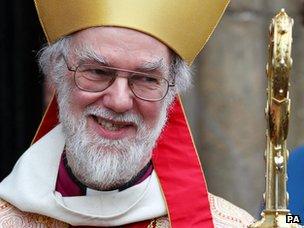
Rowan Williams, the Archbishop of Canterbury, will stand down later this year
There is a slim chance that the "Convocations" - meetings of clergy and lay members of the Synod representing the separate York and Canterbury provinces of the Church - could veto the debate altogether.
Another possibility - rather more likely - is that a simple majority of the Synod will decide on Monday to adjourn the debate, and ask the bishops to reconsider their controversial amendments.
That would mean another Synod meeting later in the year to consider legislation which the bishops might, or might not, have changed again.
The Synod might even postpone the decision until its next scheduled meeting in February, so that the successor to Rowan Williams as Archbishop of Canterbury could preside over the decision.
Otherwise it comes down to a final vote, with each member of the Synod, especially in the House of Laity, aware of the weight of responsibility in what could be the Church's biggest decision for almost 20 years.
In the balance
Which way is it likely to go?
Not even the most seasoned commentator or campaigner can be sure of the outcome. As the Church's General Secretary William Fittall put it, "it's a mystery not a secret".
But the fact that 42 of the 44 Anglican dioceses across England voted for the legislation before it was amended is one sign of the support it has.
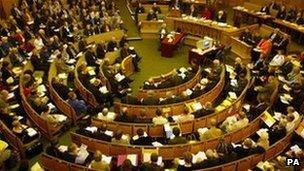
The General Synod will have to support the legislation with a two-thirds majority
At the last Synod meeting in February, there was strong backing for women bishops, and little enthusiasm for measures that might significantly weaken their position.
Following an outcry by liberal supporters of women bishops, a lot now depends on how Synod members react to the bishops' amendments to the legislation.
If the answer on Monday is yes, there will still be some important details to work out.
Guidelines for how bishops (including women) should treat traditionalist parishes in their dioceses will have to be worked out.
The Houses of Parliament will have to confirm the legislation, because the law of the "state church" is the law of the land.
But in all probability history will have been made. By the end of 2013, or some time in 2014, it's likely that the first woman bishop could be selected and ordained, and the Church would never be the same again.